 There's a review of Alec:The years have pants in the newly published Comics Journal #301. Its writer, musing upon a slickness he perceives in the art of the later portions of the book, concludes that it must be because of my 'acknowledged use of assistants.' He offers that explanation rather than the more obvious one that a worker in any field is likely, barring the burdens of ill health or senility, to acquire, by degrees, a facility in his work after practicing it for ten, twenty, and then thirty years.
There's a review of Alec:The years have pants in the newly published Comics Journal #301. Its writer, musing upon a slickness he perceives in the art of the later portions of the book, concludes that it must be because of my 'acknowledged use of assistants.' He offers that explanation rather than the more obvious one that a worker in any field is likely, barring the burdens of ill health or senility, to acquire, by degrees, a facility in his work after practicing it for ten, twenty, and then thirty years. I handed it to him in a panel in the book itself, if he got as far as page 259.

However, more pertinent to my reputation, anybody who ever did any work on a story of mine always got his or her name on it. There were one or two exceptions which arose when, if another set of hands was involved, another set of contracts were going to have to be read, signed and mailed. In these circumstances we saw it, much as we were honoured to be involved, as a job to be executed quickly and with the least hassle. That happened maybe twice and on one of those I got Pete Mullins to letter his name onto a bottle in the foreground of a panel.
Assisting a professional working comics artist is something I would have loved to have done when I was starting out. I even offered myself to one, but he didn't have the type of personality that would have lent itself to such an arrangement (he would undoubtedly have murdered me within a week). The practice has existed since the early days of the newspaper comic strips. In the very earliest period, a young fellow would work as a cleaner and gopher in the art room of a newspaper and work his way up through colouring and other such routine jobs. Then when cartoonists started to become stars and get to work at home, they would hire a young wannabe to assist. The job involves so much routine labour such as cutting and ruling paper, posting and collecting mail etc., that it was an arrangement that suited all involved. Eventually the young guy, if he proved himself both useful and talented, would get to work on the important parts of the job, and eventually get a leg up into the business on his own account. The comic books favoured a very different arrangement, closer to a factory assembly line, in which the job of making pictures in a comic book is broken down into clearly delineated activities under the headings 'layout,' 'pencils', 'inks', 'colors.' It grates me to find that many comics aspirants think of this as a natural division of labour rather than as something cooked up by the sort of people who set their minds to inventing ways to make hens lay more eggs than hens are naturally inclined to lay.
It would irritate me when that kind of thinking would turn up in places where it really didn't belong, such as Harvey Pekar's early books, where he would have a single page story with a credit box giving himself as writer, with Dumm and Budget as penciller and inker. I thought it was unseemly to have that many names on a one-pager. I thought it belonged on the packaging. Imagine if you got credits for a song actually heard in the recording instead of printed on the sleeve notes. My way of doing things was to just scribble my name next to the story title and if somebody else worked on it, then add their name under mine. Like this:

In the early 1990s I found my self able to line up way more work than I could handle. And way out here, remote from the comics publishing biz, there were enough people who were desperate to get a taste of it that I would have felt like a criminal to turn any opportunity away. But my feeling was always that this was my thing, and I'm the author, and anybody contributing to it is a guest writer or guest artist, and my way of implying that was to simply add their name after a '+' or a 'with'.
There was a fellow who wrote a few things for me who used to get mad at me because I didn't put 'writer' or 'co-writer' by his name. He didn't want people thinking he was 'just an inker' (as in 'tracer'). I told him if he wanted to use the work to get himself other work, I'd happily back him up in however much of it he wanted to claim for himself, but I wasn't putting it on the page. There was another fellow who came round when I put the word out I desperately needed help on a job. He said he didn't want to be 'just the inker'. I replied that I didn't work that way but, to be frank, I told him I wouldn't trust him to ink it. We got on fine after that. I even got him to draw a number of foreground figures when the deadline loomed.
I look at the practice of getting help on the work as comparable to a singer-songwriter hiring backing musicians. There are times in comics when extra hands are like the ingredients in a fine soup or a rich stew. It makes it all more interesting both to make and to read. I can see many places in From Hell where my attention was flagging, and I thank Fate that Pete Mullins was on the premises to keep me from looking foolish, artistically speaking. And there are loads of funny ideas in Bacchus that Marcus Moore threw in, and they still make me laugh today. And Mick Evans did all the design stuff when I thought myself a publisher, and Daren White hung around long enough to get properly recognized on the Playwright. But the Alec stuff was always different. That's my personal view of everything. It's all mine.
Labels: thoughts
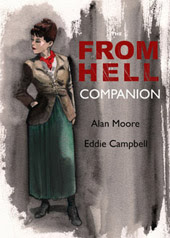
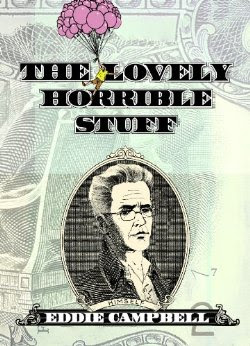

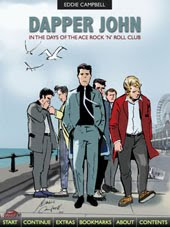
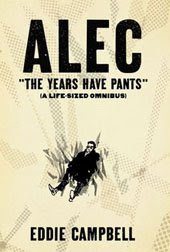
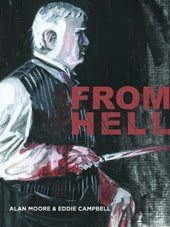
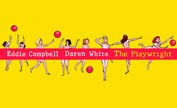
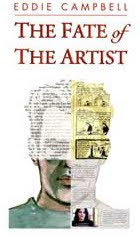




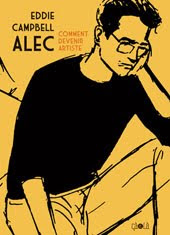

22 Comments:
I haven't finished reading the YEARS HAVE PANTS review in TCJ301 yet as I recall being irritated once I realised that I liked the book a lot more than the critic did. I'll have to go back to it.
I should get over my qualms at buying editions of comics that aren't in English and grab that Los Garriris volume, it looks wonderful.
Oh, that Robert Stanley Martin.
RSM:Criticism::Child Who Knows The Horsey Piece Moves In An L-Shape:Emanuel Lasker
I haven't got me a copy of the new TCJ yet. So I haven't read the review.
But I found this blog post very interesting. Working WITH people can always be problematic, but always intriguing.
I also have to confess I haven't been back here for ages - look at all the good stuff I've missed!
Eddie has been aware of the behind-the-scenes story of my TCJ Alec article for several months now. TCJ's editors have been asked to publicly relate how this unfortunate error made it into their published version of my review. I'd like to give them the opportunity to do so before commenting on the specifics of what happened. I do note I have twice apologized to Eddie privately for the situation, and there are plans to eventually publish the corrected version of the review at The Hooded Utilitarian.
When the error in the review first came to light in February, I wrote this to Eddie:
Dear Eddie:
The reference to your assistants arose from the fact that you depict yourself working with them on your projects at the stage of your career in question. While I'm sorry for the error in assuming this extended to Alec, I hope you feel it was an understandable mistake. Again, I apologize, and I hope we're all good. Thanks for your feedback.
Sincerely,
Robert Stanley Martin
This is the relevant portion of Eddie's reply:
Robert,
yes, understandable.
all is well.
I realized upon consideration where you would have got the thought. There are a few places where I draw us working like that.
I have to say I'm more than a little mystified by Eddie's statement above that "I handed it to him [me] in a panel in the book itself, if he got as far as page 259."
If Eddie is claiming that this panel makes clear that he had not and would not work with assistants on his Alec efforts, I have to confess that meaning isn't coming across to me in this panel or anywhere else on the page in question.
And if Eddie is implying that I wrote a 3000+ word essay on the book without reading most of it, I ask that he elaborate.
I've read the book cover to cover twice, and parts of it were read several times more. The essay also features what is perhaps the most substantive analysis published to date of Eddie's work and his stylistic development as a cartoonist. The small factual glitch aside--it was all of a 14-word parenthetical sentence--I am very proud of this essay.
Robert,
Thanks for writing. Your review's in print. You can hardly blame me for making the best of the situation, now can you? I even turned it into a positive essay, some two weeks after I first saw the printed article in question.
The most substantial (I presume that's what you meant- correct me if I'm wrong) analysis of my work would have to be Rich Kreiner's twelve page article in TCj #220. Or the series or articles by the fine fellows at the Thought Balloonists, which they are expanding into a book.
apart from all this agony, I hope you're having a good day.
To clarify:
Martin discovered his error after he had submitted the review and sent me an e-mail on February 15 asking me if there was still time to correct it. TCJ 301 had by then gone to the printer. But, as Martin said in his letter, "the ultimate repository of the piece is not TCJ 301, but the Pol Culture blog," so I assume it's been corrected there —or will be— for the record. I regret hat we weren't able to make the change in the print edition.
Gary Groth
To clarify further:
Gary was asked to notify me of the decision to publish the review when the draft he printed was sent to him on May 18, 2010. This was specifically so I could send the piece to Leigh Walton to pass on to Eddie for review.
Gary did not notify me of the decision to publish in a timely manner. This includes not sending me page proofs of my TCJ 301 contributions to review and correct.
I discovered the decision to publish in February after directly inquiring about it. Since I hadn't heard anything, I assumed the piece wasn't going to be included in TCJ 301, and I wanted to contribute it to the Hooded Utilitarian roundtable on Alec that appeared in March. I wrote Gary on February 13 because I wanted to make sure there wasn't a conflict.
Gary wrote back to say the review was indeed going to be published in TCJ 301. I then sent it along to Leigh Walton to forward to Eddie to review, just as I said I would when I sent the draft the previous May. Eddie responded with two emails that complained at length about the sentence he discussed today in his blog post. Gary was cc-ed the complaints.
I immediately sent Gary a corrected draft, but the corrections weren't implemented because the book was at the printer. I don't know why they weren't implemented when the book was sent to press a second time. If, as he says, Gary truly regretted the error appearing in the book, one would think he would have taken steps to fix it before ordering a second printing.
I did my best to create a situation in which any errors would be caught. If Gary had shown a modicum of editorial professionalism or even basic courtesy, this error wouldn't have gotten through.
Writers and cartoonists beware. Fantagraphics Books and The Comics Journal cannot be counted on to tell you of their publishing plans for your work. They will also exclude you from the production-editorial process, something no respectable publisher does with a book project. Furthermore, they will not fix known errors when they order subsequent printings of your work.
"If Eddie is claiming that this panel makes clear that he had not and would not work with assistants on his Alec efforts, I have to confess that meaning isn't coming across to me..."
the panel is showing an early self-awareness of the
" slickness he perceives in the art of the later portions of the book,'
If you would lose the fixation on the business of assistants for a minute, all would be clear. I think you're making much more out of this than I am. For instance it's not that I 'would not work with assistants on his Alec work'. It's more that I can't see how that could bring about a better result.
There's no moral issue at stake here, except my assertion that I have always indicated to the reader when such a practice was being used. If you were as familiar with all my work as you say, the probability of this would have occurred to you. That is, if you look at the title page of From Hell you will see Pete Mullins' name as a 'contributing artist'. You'll see his photo on the backs of several volumes of bacchus. There is no such addition to the title page or the indicia or the back or in any of the introductory essays to each section of the Alec book. There are no skeletons in the closet. Everything is up front. Your implication was not that I used assistants, which is not at issue, but that, this explained some improvements in the drawing. But that's all fair too. You're the reviewer. And I'm reviewing your review. So that's fair too.
I didn't see you commented just ahead of me. Um... I don't think we have any new information to metabolize, so ...um... "That's it, You're on your own, I'm outta here."
RSM's inability to parse the panel included in the post here certainly seems to dovetail with his inability to parse the opening panel of every story in the book.
His dismissal of most of the work from having even any contextual value alongside the select stories that he admires is just, like, his opinion, man.
The most offensive bit of the review (in just my opinion, man) was not the easily Google-able facts that he neglected to Google, but that the whole review was just boring and overly prolix. As are his comments above.
"I then sent it along to Leigh Walton to forward to Eddie to review..."
How many of us reviewers rely on the author of the book we're reviewing to do our fact-checking for us?
Lazy. RSM has somehow got hold of Dr Heller's Blame Thrower.
overly prolix
Careful now, we'll be needing that bathwater later.
It's less the facts being googleable for me, than them being stated in the text itself. He says "acknowledged use of assistants," and yet there are no such acknowledgements in the book. Would that some conclusion could be drawn from this fact!
Pete and April might make on-panel appearances, but I don't remember anyone saying "I finish Ackagarry now, I go bed."
OUCH, y'got me. I throw the blame at DFW.
Was it Mr B or Mr G that you offered your assistance to, or am I off the mark here?
Interesting little discussion. Too bad everybody's talking past each other.
Eddie is assuming RSM has mind-reading abilities. And if anyone has a fixation, it's Eddie. This is one sentence in a fairly long review. You'll miss it if you blink.
RSM should remember that all editors and publishers are incompetent. Unpaid interns do all the actual work these days, and publishers get what they pay for. You never send anything but a perfect draft. If the publisher can fuck up, they will fuck up. I hope he learned his lesson.
RSM should also cut down on the ten-dollar words. He's not a bad writer, but his vocabulary occasionally gives me the giggles. Kenneth Smith isn't someone to emulate.
Groth looks bad even by the standards of incompetent publishers. If this is typical, it's no wonder just about every established cartoonist not named Hernandez won't publish new work through Fantagraphics anymore.
I hope for the sake of everyone's sanity this error gets fixed before it shows up in the TCJ archive. Isn't that the "ultimate repository of the piece?"
Forgive the intrusion. I haven't got past the Cerebus essay in TCJ 301 yet, but that's one of my favourite panels in Alec. I groped towards why it was, back when I thought I could write stuff like this out loud at http://skpow.com/post/2997087027/campbell-panel
Forgive the awful prose. Something else I just thought of about that panel that's quite cute is that its creation is some time after the event, so nearer or perhaps past the moment of the change in places?
All the best, sir
steve,
I'll amswer you in a new post.
I look forward to it. I've just read the RSM review and I had to put the thing down three times because I couldn't recognise your work from the descriptions. But it's made me take down The Complete Alec (which I feel I may have been jipped on now) and I'll retire to bed on it. And as I sit here and type this with the thing on my lap, apart from getting nostalgic about the soft top yellow capri, is that really Nixon on the pub sign? As to the review: "Pah!! - Here's to life"
No, Nixon was an accident. And you can quote me on that.
Publishers beware. Robert Stanley Martin cannot be counted on to write reviews that contain actual true facts. Once he has submitted his fact-deficient writings, he will blame the publisher for publishing them rather than catering to his vague ongoing desire/request to retroactively fix them, something no respectable writer does.
Fortunately, there is an excellent venue for this type of writer, one in which RSM appears to have ended up anyway, and you are looking at it now.
(This is not intended as an insult to bloggers. Some of my best friends, etc.)
It's nice to know Kim Thompson doesn't think that catching and fixing mistakes is part of the editorial process. That explains quite a bit.
Of course, credit and "credits" don't mean anything once anyone ventures into the Antipodean Comics Realm of "I'm a writer who never made royalties from Diamond Distributors or Gordon and Gotch,
but I expect illustrators to feel lucky to slave for my sorry-unpublished-but-bloggist-arse for 8 hours or more per page for 24 pages or more of wannabe graphic-novel material",
even when these 'writers' cannot come up with an 'idea' more 'original' than zombies/vampires/revisionist-retro-con-claptrap stolen from someone else published by a real company over 2 years ago.
Which is far more nauseating than anything Kim has been said to have done, as per above comments.
Post a Comment
Subscribe to Post Comments [Atom]
<< Home